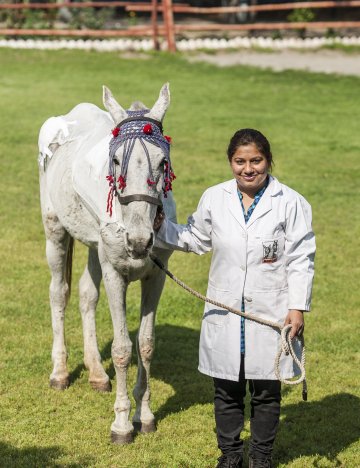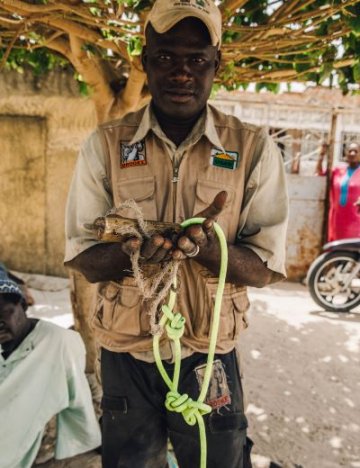How Brooke teams around the globe are working together to prevent AMR
This week is the World Health Organisation’s Antimicrobial Resistance (AMR) Awareness Week, and this year’s theme is preventing antimicrobial resistance together. AMR is a pressing threat to us all, and Brooke is proud to have many areas of work that contribute to its prevention.
Brooke East Africa
Brooke East Africa is working with veterinary medicine sellers, or Agrovets, using the Agrovet Mentoring Framework (AMF) to mentor and train them on the job in subjects including pharmacology, clinical governance, and which medicines to stock in their shops. Agrovets are an essential part of animal health systems in East Africa, with 70% of farmers going to them for primary animal healthcare. An area of focus for training is antimicrobial stewardship, as Agrovets themselves identified a lack of knowledge on AMR. Through the AMF Brooke is helping to prevent AMR by ensuring appropriate use of antimicrobials in a regulated, accountable way.
You can find more information about this work here: Empowering Agrovets through mentorship.
Brooke Ethiopia
Brooke Ethiopia has been instrumental in developing Ethiopia’s national essential veterinary medicines list (EVML), which has been finalised in 2023. Currently very few veterinary medicines are available, meaning the same drugs are being used repeatedly, and often inappropriately. A survey conducted by Brooke in January 2020 found that at some government health posts, 100% of cases received some form of systemic antimicrobial. These practices create huge risk of AMR developing. The newly formed EVML will be used to improve access to a wider range of medicines in more appropriate formulations, helping to prevent AMR.
Brooke Ethiopia has also been working with veterinary training institutions to improve curricula, and helped set up a new clinical skills lab at Jimma University in February 2023. The lab enables the university to train vet students in practical skills such as dose calculations, drawing up medicines, sterility, and injection techniques, enabling safe and appropriate use of antimicrobials, and preventing infections. Improving clinical teaching standards in this way will contribute to preventing AMR.
You can find more information about this work here: Essential medicines for livestock, How clinical skills strengthen animal health systems.
Brooke India
Brooke India played a key role in organising a One Health camp in the state of Uttarakhand in October 2023, in collaboration with the One Health Support Unit and the Government of India’s Department of Animal Husbandry and Dairying. The initiative focused on improving the health of local animals and their owners, and addressed zoonotic diseases, hygiene and sanitation. The camp highlighted the One Health concept, and the interconnections between animal, human and environmental health.
This work on One Health helps to prevent AMR by improving understanding of disease transmission and hygiene, and highlights how closely connected human and animal health are, underlining the significance of AMR and the importance of preventing it.
You can find more information about this work here: Brooke India Instagram, One Health at Brooke.
Brooke Latin America and Caribbean
Brooke Latin America and Caribbean has been using Brooke’s flagship Animal Health Mentoring Framework (AHMF), to improve skills of animal health practitioners in Nicaragua. The AHMF involves on-the-job mentoring, identifying individual knowledge and system level gaps, and targeting training for practitioners. The AHMF focuses on skills including clinical expertise, such as drug dosing and injection techniques, kit contents, assessing whether appropriate medicines and sterile equipment are available, clinical governance, and communication skills, for example advising owners on how to give ongoing treatment and prevent problems in future.
The AHMF helps to prevent AMR by creating a network of well-trained animal health practitioners who use antimicrobials responsibly.
You can find out more about the AHMF here: Brooke's AHMF page, AHMF's long-term impact.

Brooke Pakistan have been working in partnership with regional Livestock and Dairy Development Departments to strengthen animal health systems. A specific challenge Brooke identified was the minimal use of animal health guidelines and protocols, and limited engagement with farmers and communities around antimicrobial use. The partnership has trained vets and paravets in animal welfare, equine health and handling, clinical governance and communication skills. They have also ensured improved availability of appropriate formulations of antibiotics, and promoted responsible use of antimicrobials.
This partnership has been key to preventing AMR by improving knowledge around appropriate use of antimicrobials throughout the animal health system in Pakistan.

Brooke West Africa has continued its work training animal health practitioners, with recent training in Senegal, Cote D’Ivoire, and Burkina Faso covering topics including diagnosing and treating equine eye conditions, biosecurity, and appropriate use of veterinary medicines in equids. Equine medicine is often overlooked at veterinary training institutions in countries where Brooke works, and animal health practitioners often have limited knowledge of appropriate equid treatments. So, this training is essential for ensuring medicines and particularly antimicrobials are used responsibly for these species. In West Africa, Brooke trained 110 animal health practitioners between July and September 2023.
Global Research
Brooke is currently funding (alongside The Horse Trust) and co-supervising PhD research by Girma Birhan Asteraye on “The Burden of Animal Disease in Working Equids – Ethiopia”, as part of the Global Burden of Animal Diseases (GABDs) programme. GBADs is a programme jointly led by the University of Liverpool and the World Organisation for Animal Health (WOAH), aiming to improve animal health through building understanding of diseases affecting livestock. The PhD research aims to better understand working equid populations, how they contribute to livestock systems and communities, the diseases that affect them and the impact of those diseases on society.
This research helps to prevent AMR by building an evidence base with which to strengthen animal health systems, from increasing vaccine and medicines access, to improving diagnostic infrastructure. This in turn will enable animal health practitioners to use antimicrobials more prudently.
You can find more information about this work here: Brooke's collaboration with the GBADs, GBADs in Ethiopia, Brooke-funded PhD study into GBADs.
Global Animal Health
Brooke have been working with the World Veterinary Association (WVA) to create the first essential veterinary medicines list for livestock, which will be published in 2024. The aim is that the list will be applicable globally, and will be of most use to countries where limited access to medicines is negatively impacting on the animal health system, and often contributing to AMR.
The list will help to prevent AMR because by increasing access to appropriate medicines, in appropriate formulations, it will be much easier for animal health practitioners to target treatments to specific infections and avoid blanket treatment with antimicrobials, which is currently common.
You can find more information about this work here: Essential medicines for livestock page, Brooke/WVA blog.
Global External Affairs
As part of our external affairs work, Brooke has convened the Action for Animal Health coalition, which advocates for investment to strengthen animal health systems for the sake of humans, animals and the environment. Earlier this year, the coalition launched a report making “The case for investing in animal health to support One Health”, and a key element of this report outlines the threat of AMR and how investment in animal health systems can prevent it.
You can read more information about this work here: Global External Affairs page, Action for Animal Health website, Action for Animal Health latest report.
